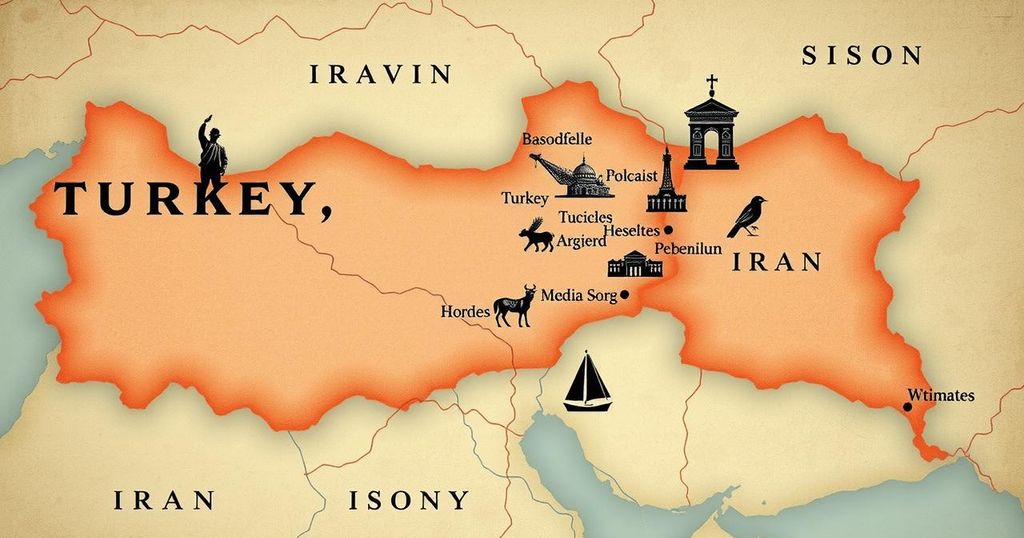Escalating Tensions: The Intensifying Rivalry Between Turkey and Iran over Regional Influence

Turkey and Iran’s tensions have escalated due to regional power shifts following the Syrian conflict. Turkey seeks to exploit Iran’s weakened influence to strengthen its own regional ambitions in Syria and Iraq. Various Iranian officials have responded, warning against interference in their affairs. While both countries may aim to avoid full conflict, their rivalry presents risks of broader regional instability.
Turkey and Iran have recently experienced heightened tensions, especially regarding the conflicts in Syria and Iraq. Following the weakened position of Iran after the fall of Bashar al-Assad’s regime, Turkey has sought to expand its influence in both nations. Particularly, an incident was sparked by Iranian criticism of Turkish policies in Syria, leading to stern warnings from Turkish officials about Iran’s interference in regional matters.
Turkey has long viewed Iran’s actions as destabilizing, particularly since a 2015 meeting between King Salman and President Erdoğan aimed at forming a united front against Iranian sectarianism. However, despite previous agreements, Turkey has hesitated to fully align with Saudi Arabia due to various geopolitical factors, such as Iranian influence in Syria and Turkey’s energy dependencies. Today, the dynamic appears to be shifting in favor of Turkey, as it seeks to leverage Iran’s weakened position to achieve its foreign policy ambitions.
Moreover, the Israeli military actions that began on October 7, 2023, weakened Iran and its associates, further impacting its influence in the region. Turkey, less reliant on Iranian energy since diversification efforts post-2018 U.S. sanctions, views this as an opportunity to solidify its trade and political alliances, especially in Iraq, which is strategically important for Turkish interests.
In response, Iran is determined to counter Turkey’s perception of its vulnerability. High-ranking officials, including Supreme Leader Ali Khamenei’s advisor, publicly condemned Turkish actions, hinting at potential Iranian retaliation if Turkey supports anti-Iran elements. Iranian state media has issued warnings of repercussions for any Turkish efforts that could destabilize Tehran, especially given Turkey’s internal vulnerabilities related to its ethnic minorities.
Amidst rising tensions, Iranian officials have raised concerns regarding Turkey’s historical influence in Iran’s ethnic minorities, accusing Ankara of fostering separatist sentiments, particularly in provinces populated by Azerbaijanis. Such accusations are part of a broader Iranian strategy to publicly assert its leverage over Turkey, emphasizing its capability to incite internal unrest within Turkey’s diverse population.
In the context of Syria, Iran retains the potential to complicate Turkish objectives, indicating its ongoing support for various factions that could undermine Turkish efforts, notwithstanding its own weakened position. The divergence within Iranian leadership regarding Syria’s future compounds the uncertainty surrounding Iran’s next steps, with some calling for a reassertion of influence while others criticize past support for the Assad regime.
Similarly, in Iraq, Turkish aspirations for deeper trade and energy ties face the challenge of Iran’s established political influence, complicating Turkey’s efforts and highlighting the fragility of the situation. Influencing Baghdad remains critical for Turkey, especially as it seeks to counter Iranian leverage.
Despite a desire to de-escalate tensions, both countries must navigate their interactions with caution. While there is potential for dialogue, Turkey’s growing assertiveness coupled with Iran’s determination to maintain its influence highlights the precarious nature of their relationship. Although a full-scale conflict is unlikely, the risks of escalating their rivalry into broader regional competitions persist as they vie for supremacy across several fronts.
In conclusion, the escalation of tensions between Turkey and Iran illustrates a significant shift in regional power dynamics following changes in Syria and broader geopolitical shifts. With Turkey aiming to establish greater influence amid a weakened Iran, both countries remain locked in a complex rivalry that could potentially destabilize not only Syria and Iraq but the wider region. Continuous monitoring of their interactions is essential, as their competition may exacerbate existing conflicts and lead to unintended consequences for both nations and their neighbors.
Original Source: www.mei.edu








